EU Sanctions Target Iranians Making Attack Drones For Russia
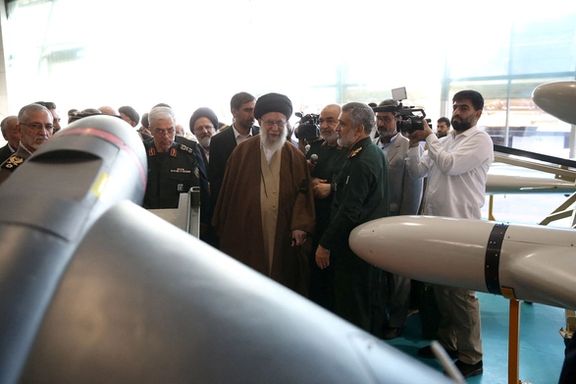
The EU has brought sanctions against Iranians involved in the manufacture of unmanned aerial vehicles (UAVs) used by Russia in Ukraine.

The EU has brought sanctions against Iranians involved in the manufacture of unmanned aerial vehicles (UAVs) used by Russia in Ukraine.
The European Council – the EU’s governing body - has implemented the new set of stringent measures against six individuals and five outfits engaged in Iran's development and production of the drone.
This represents the first application of measures within a newly established framework aimed at restricting Iran's military support for Russia's unjust war of aggression against Ukraine. The measures align with earlier sanctions against Iranian drone-related activities.
The new measures target Iranian company Shakad Sanat Asmari, its CEO, deputy CEO, and chief scientist. Also engaged in the production of UAV components are Baharestan Kish Company and its managing director, Saad Sazeh Faraz Sharif and its CEO, while Sarmad Electronic Sepahan Company provides aerospace engineering services. Kimia Part Sivan Company assists Iran's Islamic Revolutionary Guard Corps Quds Force (IRGC-QF) in advancing the UAV program. All have now been subjected to the measures.
The sanctions encompass asset freezes and travel bans within the European Union. Any supply of funds or economic resources, whether directly or indirectly benefiting those listed, is strictly forbidden.
The Council has strongly criticized and declared as unacceptable any type of military assistance from Iran, encompassing the transfer of UAVs to Russia's war of aggression against Ukraine. The arms provided by Iran have been employed indiscriminately by Russia, leading to extensive destruction and human suffering among Ukraine's civilian population and infrastructure.
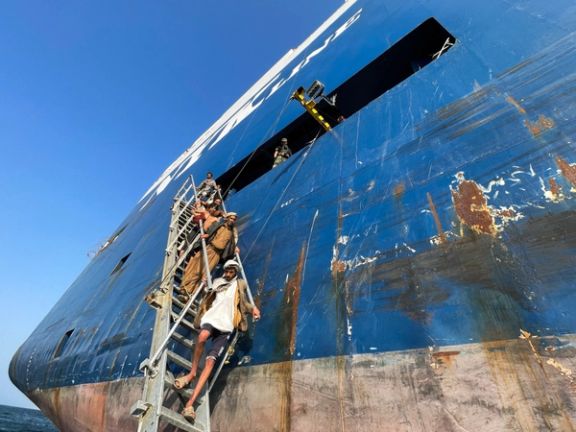
Yemen's Houthi rebels claim to have stopped a ship heading to Israel in the group’s latest response to the Gaza conflict.
In a statement on X, Hussein al-Ezzi, deputy foreign minister of the Iran-backed Houthis, said that their navy forced the vessel "sailing towards occupied Palestine" to change its course and return.
The claim has not been confirmed and the account is unverified.
The Houthi rebels, supported by Iran, have escalated their activities amid the ongoing Israel-Hamas conflict.
The group has targeted Israel with missiles and drones and carried out attacks on ships in the Red Sea, including the seizure of an Israeli-owned vessel in November.
On Sunday, the Houthi information minister threatened to target all US and Israel shipping in the region.
Jon Finer, Deputy US National Security Adviser, recently said the Biden administration has not excluded military action against the Houthis as an option. However, the priority for now is establishing a maritime coalition to safeguard the Red Sea, a critical route accounting for 12% of global trade and a significant portion of energy supplies from the Middle East to Europe.
The Houthi rebels, aligned with other Iran-backed militant groups, have been effectively at war with Saudi Arabia since 2015. They have voiced support for Palestinians, especially following the Hamas terror attack on Israel on October 7. While Iran supports Hamas, it denies any involvement in the recent Red Sea vessel attacks. Tehran also supports Hezbollah, a Lebanese militant group with strong connections to both Hamas and Islamic Jihad, another Palestinian faction in Gaza also backed by Iran.
Iran's present strategy includes the use of proxy forces to target Israel, Israeli assets, and US military installations in the region.
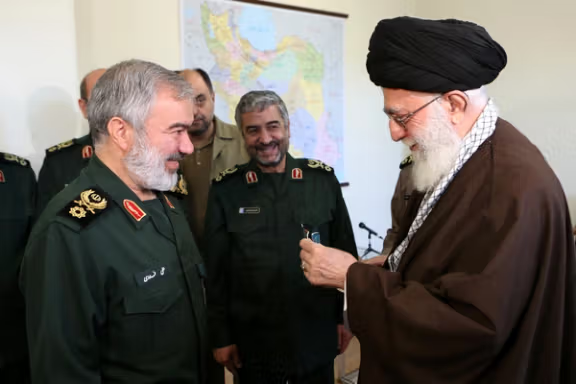
The IRGC is indifferent to who becomes Iran's next president or the outcome of parliamentary elections in March, its deputy commander Ali Fadavi has said.
During a speech at Jondi Shapur University in Ahvaz, Khuzestan Province, Fadavi emphasized that the crucial aspect for the IRGC is that the Iranian people heed Supreme Leader Ali Khamenei's directive to participate in the elections.
The implications of Fadavi's statement remain unclear. It could suggest that, like many Iranian media outlets and politicians, the Guards recognize the futility of holding elections that lack freedom, fairness, and competitiveness. Alternatively, it might indicate that the IRGC is withholding support for any specific candidate.
Fadavi's subsequent remark, "The IRGC is not going to sacrifice its reputation for any individual," implies a lack of faith in the merits of any candidate and underscores the IRGC's perceived supremacy over Iranian politicians. He asserted that while individuals may sacrifice themselves for the IRGC, the organization will not sacrifice itself for anyone.
Elsewhere in his speech, Fadavi elaborated that "We will not spend anything for anyone who would want to become the President or a member of the parliament, because the issue is not important at all."
During the past week, as the date for the parliamentary (Majles) elections gets closer, many politicians have said that Iranians do not care about the upcoming elections and that the turnout could be even lower than in the 2020 parliamentary vote and the 2021 presidential elections which were the lowest during the past 45 years.
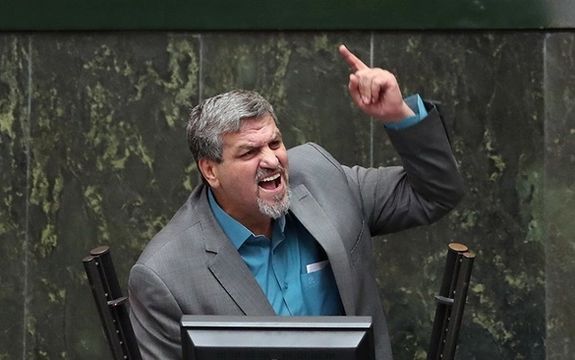
Former reformist lawmaker Mostafa Kavakebian said in his Student Day speech that most university students do not know that this is an election year. Earlier, prominent conservative politician Hamid Reza Taraghi had said the same thing about the population as a whole.
While moderate and pro-reform politicians in Iran have lost all hopes in the competitiveness of the upcoming election, only hardliners and ultraconservatives appear to take it seriously.
Even within the conservative camp, divisions are so deep and widespread that moderate and traditional conservatives such as former Majles Speaker Larijani and Expediency Council member Mohammad Reza Bahonar are not so sure that they could get through biased vetting by the Guardian Council. Of the two politicians, the former is not running, and the latter has openly said that he fears disqualification.
Meanwhile, conservative commentator Mohammad Mohajeri has said that major conservative groups are not so keen to forge strong alliances ahead of the elections as they are almost certain that the ultraconservative Paydari Party will betray them at the last moment as it has done in previous elections. As a result, every major hardline conservative group and party is likely to present its own separate list of candidates.
This would mean an even lower turnout than previous rounds and less credibility for the Majles, as those who eventually win the elections are likely to win smaller number of votes. Without a strong coalition to rally voters behind a group of candidates, few are likely to win more than a few hundred thousand votes even in big cities such as Tehran, Mashhad, and Esfahan.
Mohajeri further said that the main competition in the parliamentary elections will take place between Paydari and the supporters of current Majles Speaker Mohammad Bagher Ghalibaf. He added that regardless of reports about a coalition between Ghalibaf and Paydari, the former is making preparations for a campaign without a coalition, presumably due to Paydari's unpredictability.
Meanwhile, speaking about the possibility of former President Hassan Rouhani uniting low-key moderate and reformist candidates to win a sizeable minority in the next Majles, conservative politician Ali Yousefpour expressed doubts. He argued that Rouhani has lost his credibility among the voters due to his failure to sort out the country's economic problems during his presidency.
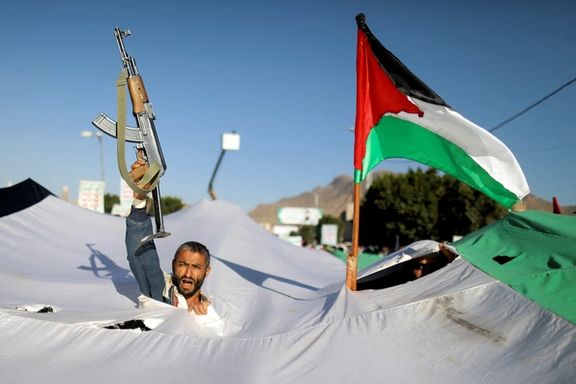
After several weeks of sporadic attacks on Red Sea shipping, Iran-backed Houthis of Yemen have threatened all ships in addition to US and Israeli vessels.
Houthis’ Information Minister Dhaif Allah (Dhaifullah) Al-Shami said Sunday that their forces will attack sensitive targets of Israel and US in the region if they move to act against the Houthis. Bragging about their attacks on vessels, he claimed that these are in response to Israel's offensive in Gaza.
Palestinian Islamist militia Hamas, another Iran-backed group, declared war on Israel on October 7 in a surprise attack that they codenamed Operation Al-Aqsa Flood, killing over 1,200, mostly civilians and taking about 250 hostages. In retaliation, Israel has been pounding the enclave to uproot Hamas, which has made the war exceedingly bloody hiding deep among the civilian population and underneath the coastal sliver’s non-military facilities.
Al-Shami's remarks came a day after General Yahya Saree, the military spokesman for Houthi rebels, warned that they would target all ships heading to Israel, regardless of their nationality. He also warned all international shipping companies against dealing with Israeli ports. "If Gaza does not receive the food and medicine it needs, all ships in the Red Sea bound for Israeli ports, regardless of their nationality, will become a target for our armed forces."
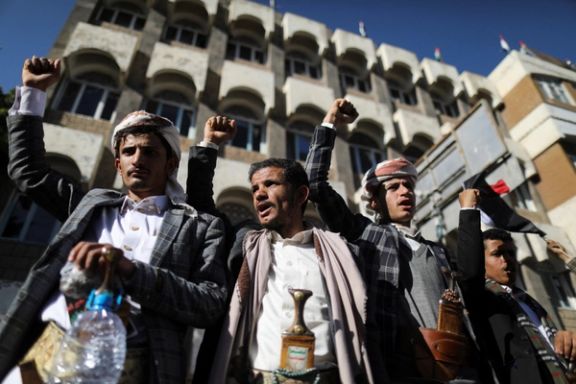
The Houthis have attacked and seized several Israeli-linked ships in the Red Sea and its Bab al-Mandab strait, a sea lane through which much of the world's oil is shipped, and fired ballistic missiles and armed drones at Israel.
According to Israeli media, Prime Minister Benjamin Netanyahu has reportedly told US President Joe Biden and German Chancellor Olaf Scholz that if they do not take military action against the Houthis soon, Israel will. The US government’s reaction to attacks on vessels in the Red Sea has been a mixture of blaming Iran and downplaying the threat to the US Navy.
The New York Times reported on Saturday that senior Israeli defense officials have intelligence that Iran is urging their regional allies, such as Hezbollah and the Houthis, to increase their attacks and pressures against Israel.
Al-Shami described the threat by the Houthis’ military spokesman as “historic,” claiming that targeting ships belonging to other countries is the next phase to put pressure on Israel after the first phase of targeting Israeli-linked ships. “This statement is a historic declaration for Yemen; a country that has been under siege and attack, facing ruthless and rebellious forces for nine years. Yet today, it rises in support and assistance to the oppressed in Gaza and throughout Palestine.”
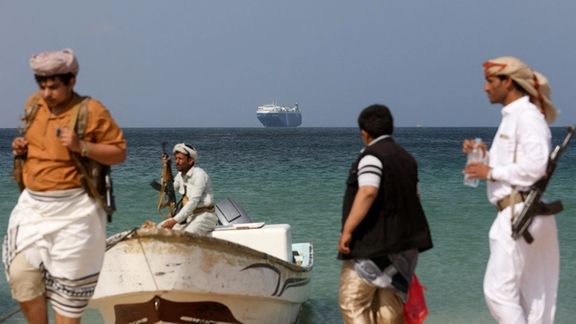
Earlier in the day, France’s defense ministry said a French warship operating in the Red Sea has shot down two drones that were launched at it from the Yemen coast. On Friday, British officials warned shipping in the Red Sea to “exercise caution.” In another one of the latest incidents, three commercial vessels came under attack in international waters last week, prompting a US Navy destroyer to intervene. The Houthis, which rule much of Yemen and its Red Sea coast, also seized last month a British-owned cargo ship that had links with an Israeli company.
The Houthis are one of several Iran-backed militant groups in the Middle East. They have been effectively in a state of war with Saudi Arabia since 2015 and have claimed support for Palestinians since the Hamas terror attack on Israel on October 7. Iran supports Hamas but says it did not play any role in the Islamist militants' terror attack that triggered the current crisis. Tehran also denies involvement in the recent attacks on vessels in the Red Sea. Iran also backs the Hezbollah, a Lebanese militant group that has deep ties with Hamas and Islamic Jihad, another Palestinian faction in Gaza that is also backed by Iran.
Iran's current war strategy is employing proxy forces to target Israel, Israeli assets, and US military installations in the region. Since the October 7 attack, Tehran has been warning of the spillover of the conflict in case of a regional escalation, but at the same time cheers attacks against Israel and the United States.
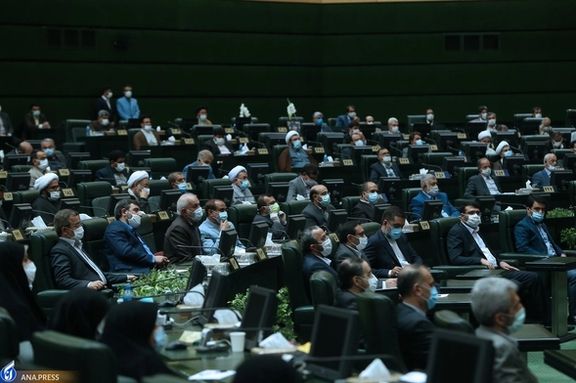
Iran's parliament has given its approval for a bill aimed at fostering cooperation with Russia in the realm of information security, as both countries are accused of extensive cyber attacks.
The bill, which implements an agreement signed three years ago by former Iranian Foreign Minister Mohammad Javad Zarif and his Russian counterpart Sergei Lavrov, received the green light from parliamentarians.
Comprising nine articles, the bill focuses on combating cyber threats, fortifying information security measures, and fostering collaboration between Iran and Russia. A notable clause in the legislation addresses the exchange of information and cooperation in prosecuting criminal offenses between the two nations.
Before the parliamentary vote, Abolfazl Amouei, spokesperson for the National Security and Foreign Policy Committee, advocated for the bill, citing the emergence of cyber threats against the two countries. He stressed that the collaboration between the Islamic Republic of Iran and the Russian Federation, as outlined in the bill, provides responsive solutions to counter these evolving threats.
However, Hosseinali Haji Deligani expressed his opposition to the bill, stating, "The terrorist objectives for the Islamic Republic of Iran and Russia differ, and the bill lacks specificity regarding the nature of collaboration. In essence, the sections are ambiguous, failing to provide guidance on how to proceed if the exchange of information contradicts our laws."
In recent years, Tehran and Moscow have strengthened their political, military, communication, and cyber ties, prompting concerns among Western countries and their allies. Microsoft's Threat Analysis Center (MTAC) recently reported that Russia, Iran, and China are likely planning to influence upcoming elections, including those in the United States in 2024. The report warned of potential targeting of "election infrastructure, campaigns, and voters" by authoritarian regimes.
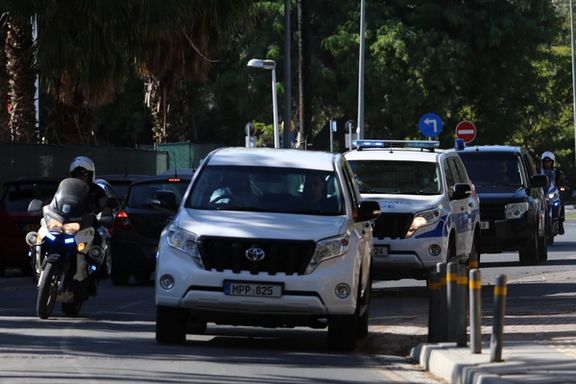
Two Iranians have been detained in Cyprus for questioning over suspected planning of attacks on Israeli citizens living in Cyprus, a Cypriot newspaper reported on Sunday.
The two individuals were believed to be in the early stages of gathering intelligence on potential Israeli targets, the Kathimerini Cyprus newspaper said without citing sources.
The paper added that the Iranians were political refugees in contact with a person linked to the Iranian Revolutionary Guard.
A senior Cyprus official declined to comment, citing policy on issues concerning national security.
Barely a 40-minute flight from Israel, Cyprus is a popular holiday and investment destination for thousands of Israelis.
Also on Sunday, Israeli Prime Minister Benjamin Netanyahu said the Israeli intelligence service Mossad helped Cyprus foil an Iranian-ordered attack against Israelis and Jews on the island, saying such plots were on the rise since the Gaza war erupted.
Israel is "troubled" by what it sees as Iranian use of Turkish-controlled northern Cyprus "both for terrorism objectives and as an operational and transit area," the statement added.
Netanyahu also said in June that an Iranian attack against Israeli targets in Cyprus had been thwarted. Iran has been implicated in many assassinations, kidnappings and terror attacks abroad against dissidents and opponents.
In the past, Israel and Cyprus have worked together to foil Iranian attacks on Israelis. Two years ago, an Azeri national with a Russian passport, who was acting on behalf of the Iranian Revolutionary Guards, was arrested by Cypriot intelligence services. The hitman was hired to kill an Israeli businessman.
Earlier this year, the IRGC accused Israel of assassinating its military adviser Milad Haydari with an airstrike in Syria, vowing to retaliate.
(With reporting by Reuters)